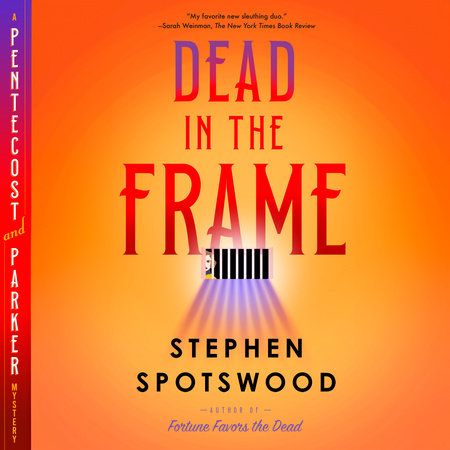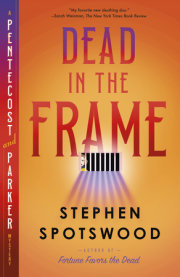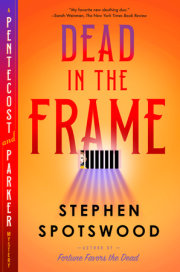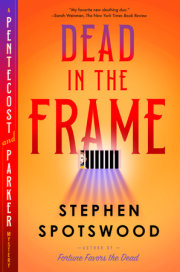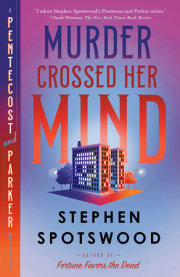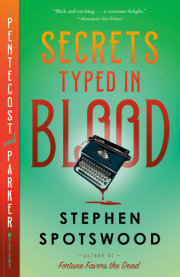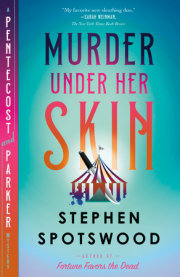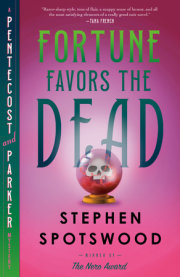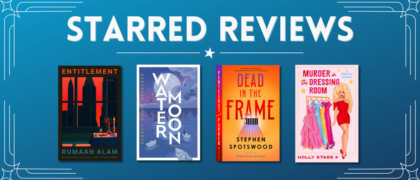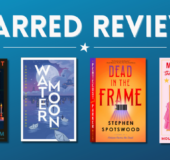Chapter 1
“Grimm knew something was wrong even before he turned on the light. It was the smell. Burnt powder and wet copper and that particular rot you get only with something that used to be a human being. He’d smelled it plenty in the war. In the moment before he flicked the switch, he said a silent prayer.
“Please don’t let it be one of my friends this time.
“The bare bulb in the office ceiling ignited and Grimm closed his eyes. Too late. That split second had already been burned into his mind, so he opened them again.
“Another prayer unanswered.
“ ‘Aw, Briggsy.’
“His partner was slumped over his desk, right arm dangling at his side, gun hanging from his fingers. The blood sprayed across the threadbare carpet, almost to the door.
“No, Grimm thought. All the way to the door. There were flecks of red speckling the pebbled glass. One thick spot dotted the second i in Investigations.
“ ‘That’s a keeper,’ Briggs would have said.
“Something inside Grimm lurched, and he couldn’t tell if it was his stomach or his heart. He didn’t have time for either to settle. With insides squirming, he stepped forward to examine his dead partner.
“He reached toward Briggs’s head but stopped. What about fingerprints?
“Hell, he thought. It’s my office. My prints are everywhere. Besides, he wanted to see Briggs’s face.
“He gently tilted that cinder-block head to the side.
“If not for the entry hole above his right ear, it could have been any other Friday night at the bar. Briggs after one whisky too many, laying his cheek against the liquor-stained wood and telling the bartender, ‘Don’t worry, I ain’t sleeping. Just cooling this side of my face.’
“It could have been the night that Grimm had sat down next to him and started talking about what to do now that their respective careers as police officers were done—Grimm because of his tongue, Briggs because of his fists. At some point, Grimm brought up, so casually and spontaneously, how there were a lot of private operators working the city.
“ ‘You think we should be private dicks?’ Briggs asked. ‘Those guys are assholes, Danny.’
“ ‘Yeah, but they get paid good money to be assholes.’
“Now he was dead, and one way or another it was Grimm’s fault.
“He tilted his friend’s head back. Gently, like he didn’t want to wake him. As he did, he noticed there was a sheet of paper in the typewriter. He leaned in and read.
“Danny,
“I’m tired of the scramble. Tired of working to make things right. There ain’t no getting back to even in this world and I’m done trying.
“Goodbye. I’m sorry.
“Briggs
“Briggs had said something like that to him just last week. The lunk could get real maudlin when the drink got on top of him.
“A car horn sounded somewhere on the street outside, and Grimm snapped to. How long had he been standing in here, leaning over a dead man?
“He should call the cops. They’d come, all right. Probably in record time. Suicide note or not, they wouldn’t pass up a chance to get Daniel Grimm in a box.
“No, he had things to do.
“He opened the battered filing cabinet and retrieved the file on Zachary Boon. Inside were the notice of receipt for Lydia Boon’s check, the photo, and the blackmail note.
“The cops would get a real kick out of the photo. Probably pass it around the station house. Grimm figured Lydia Boon had had enough heartache.
“He rolled up the file and slipped it inside his jacket before retrieving the .45 he’d taped behind the filing cabinet. Briggs had said it was a clean piece, and Grimm had no reason to doubt him.
“With what he figured was his last look at his partner, Grimm left the office, closing the door softly behind him, then moved to the back stairs. He knew a bar about twelve blocks south where he could find a quiet corner to think.
“Think about who might have murdered his partner.”
Holly paused then added, “That’s the end of the chapter. What do you think?”
“I think the same thing I thought the first time I read it,” I told her. “It’s a knockout. I don’t know what you’re worried about.”
I tried to see what her face was doing, but that was tough to do while driving. We were on a particularly curvy stretch of highway, and while the Packard handled smoothly—it was a ’47 model and barely off the assembly line—I could only account for my own steering. It was mid-October and the leaves had changed, so a lot of drivers had their eyes on the trees instead of the blacktop.
We’d spent the last three weeks sharing a Catskills cabin. Holly to finish her novel, me to keep her occupied between chapters. No phone, no newspapers, no nosy neighbors wondering who those two women were from New York City. Sisters? Cousins? Do cousins kiss like that in New York?
A lot of occupying got done.
Now we were on our way back, my first-ever vacation complete, and Holly’s first novel in the books, so to speak. The finished product sat in her lap—a stack of 247 typewritten pages held together with a binder clip. She’d typed “The End” only two nights before and had proclaimed it “not bad.” Which is the highest praise she ever heaped on herself.
“I’m worried it’s too easy,” she said. “When you get to the end of that chapter and Dan Grimm tells you it’s a murder, how surprised are you?”
“At this point, not at all.”
“Will, be serious. How surprised were you the first time?”
“I don’t know if I’m the best gauge to use,” I said. “I do this for a living, after all. I have an eye for clues.”
“The people who read this will have read a hundred mysteries like it,” she reminded me. “They’ll have an eye, too.”
“Why don’t you save all the copyediting questions for Marlo and Brent? They know this stuff better than I do. The fictional variety, I mean.”
Marlo and Brent Chase were the owners of Strange Crime Press and Holly’s novel was their third book out of the gate, the first two being collections of short stories from their now-defunct Strange Crime magazine. Holly also shared their bed on some nights when she wasn’t sharing mine.
If you’re wondering how that kind of setup works, the answer is an orderly calendar and an open mind.
“I want to know your opinion precisely because you have real-world experience,” Holly explained. “Also, Marlo and Brent have been editing my work for so long, I worry they’ve gotten a little blind to my tricks.”
“You have tricks? I know about that one where you take my necktie and—”
“Stop stalling. I promise I won’t be upset, whatever you say.”
That was a promise no one could keep. There was a direct line from those 247 typed pages straight to her heart, and I didn’t want to say anything that might leave a bruise.
“Okay,” I started. “Let’s break it down. Did I know it was a murder? Sure. But I was already leaning that way because it’s a crime novel. Then there’s the blood. His desk faces the door, right? I remember the layout from Chapter One. Anyway, there’s blood splatter in a straight line to the door, but the entry was on the right side of his skull and he was facedown. The mechanics don’t work.”
I kept one eye on the road and one on Holly’s fingers, which were plucking at the hem of her gabardine slacks, telling me that her anxiety level was about a six out of ten.
“You were real subtle about it,” I assured her. “It’s a coin flip whether the casual reader sees it. Now, they’ll probably pick up on the fact that the suicide note is typed and Briggs can’t type. I mean, who’s two-finger-pecking out a suicide note when a pencil is right there? But none of these are the questions you should ask.”
The plucking paused.
“They’re not?”
“Nope,” I said. “You want to know if, using these clues, I could figure out who did it, and I could not. I wasn’t lying when I said the ending was a shocker.”
“Really?”
“Really truly. The whole time I’m thinking it’s someone close to Grimm and Briggs, because they got his voice in the note. Later, when there was the thing with the dead dog, I started thinking it was what’s-his-face. Berthol. It never crossed my mind how Grimm joked to Vickie that Briggs was his secretary. What was the line?”
“ ‘I pound the pavement, he keeps the office in order,’ ” Holly said, quoting it from memory. “ ‘I tried to put him in heels, but he said it made his toes hurt.’ ”
“Right! She knows the heels are a joke, but she doesn’t know all of it is, so she assumes Briggs knows how to type. And slipping it in as postcoital pillow talk? Perfect. Nobody remembers pillow talk, fact or fiction.”
“Is that so?”
Her hands had stilled and she was looking at me rather intently.
“Hey, I’m not saying I don’t want to listen. But in real life, I’m still trying to get my legs to stop shaking. In your book, they’re going to be bailing out of the chatter to flip back to page eighty-nine.”
“You remember the page number?”
“Page eighty-nine, second paragraph down, begins with the line ‘The zipper caught halfway and Vickie snarled, “Just tear the damn thing off, Dan.” ’ Speaking of which, why don’t you read that bit? I think there might be a typo in there somewhere.”
“Let the typo stay,” Holly said. “I don’t want you driving into a tree.”
She was smiling now and her voice had lost that edge.
A few minutes later she asked, “Do you think Lillian would know who did it?” referring to my employer, who is frequently cited in the papers as “the most accomplished female private investigator in New York City.” They could cut the “female” and still be sticking to the truth.
“She’s Lillian Pentecost,” I said. “She’d probably know who did it just by looking at the cover.”
Holly had follow-up questions, but only a few. Then she put the typed manuscript back into her handbag and placed her hand on my knee. It stayed there all the way back to the city.
It was midafternoon when I deposited her and her manuscript at her apartment in Morrisania. After which I continued on to Brooklyn, my destination the brownstone that had served as my home and office for more than five years.
That’s how long I had served as Ms. Pentecost’s leg-woman, office manager, sounding board, and occasional prodder. That doesn’t fit nicely on a business card, though, so all mine said were:
Willowjean Parker
Associate Investigator
Pentecost Investigations
Three weeks gone with no phone, no papers, and no mail had been a slice of heaven, but I was looking forward to diving into whatever had piled up while I was away. Ms. P had said she’d put business on hold, but I doubted she could go that long without picking up a new client. She’d probably been running all over the five boroughs, multiple sclerosis be damned.
Hopefully she hadn’t gotten into too much trouble while I was gone.
That was what I was thinking when I turned the corner and saw the police cars centered around our front steps.
My mind went to some bad places. I didn’t even bother parking the car. Just left it in the middle of the street and started toward our door.
“You stop that! You stop that right now!”
Our housekeeper, Mrs. Campbell, yelling from somewhere inside. Angrier than I’ve ever heard her.
A beat cop stepped in front of me, said something about how I couldn’t come any closer. I didn’t get a chance to ask him why, because that’s when I saw a pair of figures step out of the open doorway and onto the top of the stoop.
Lillian Pentecost, followed by a cop in a sergeant’s cap.
“Boss!” I yelled.
She looked up, blinking in surprise or at the sun.
“Will?”
Copyright © 2025 by Stephen Spotswood. All rights reserved. No part of this excerpt may be reproduced or reprinted without permission in writing from the publisher.

